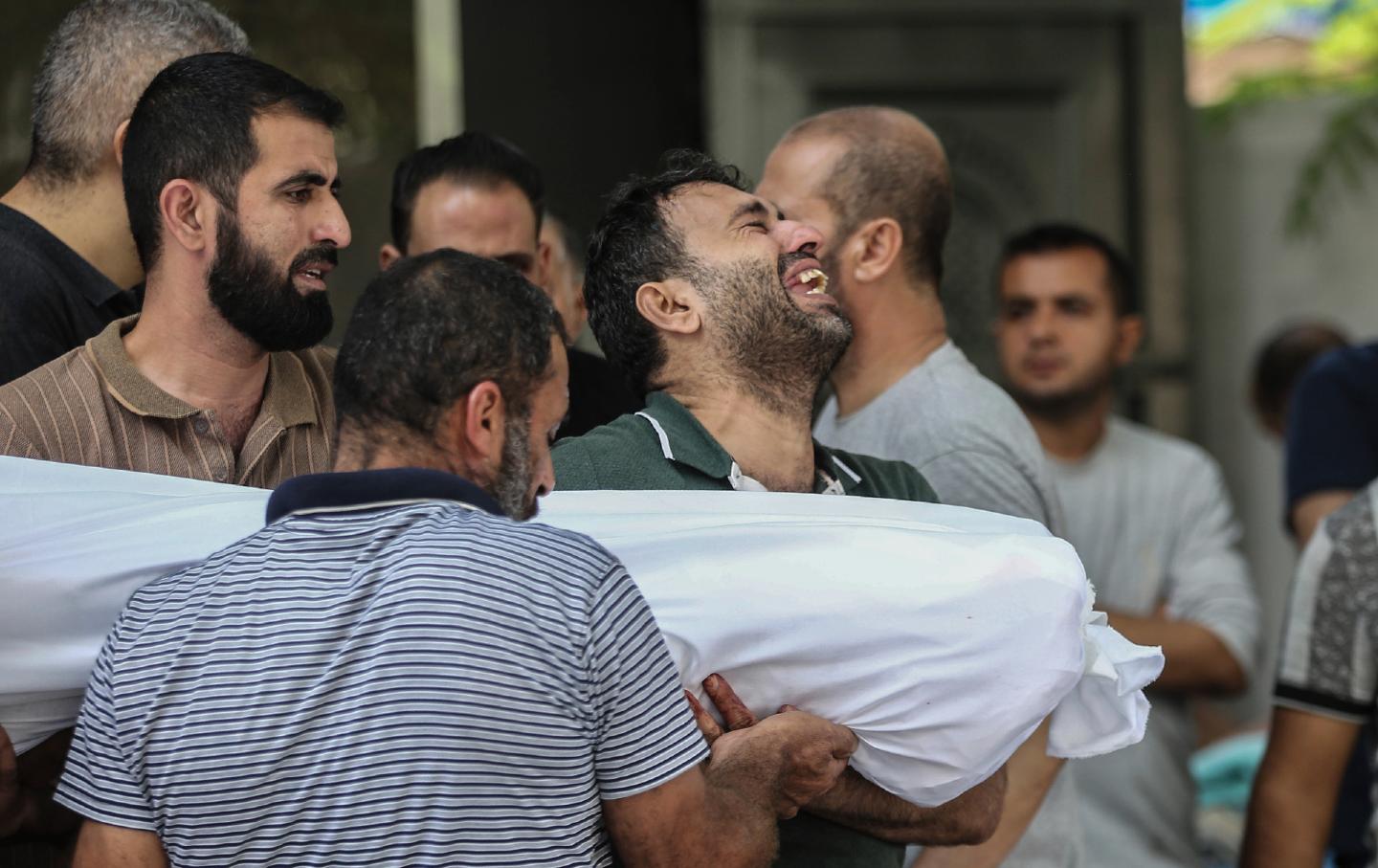Israel’s bombardment has pushed Gaza’s largest hospital, Al-Shifa, beyond its capacity, with electricity and water cuts endangering the lives of patients.

Ooutside the morgue of al-Shifa hospital in Gaza City, a Palestinian man weeps while carrying the body of one of the victims killed by Israeli air strikes.(Mohammed Talatene / picture-alliance / dpa / AP Images)
Dr. Mohammad Abu Salmiya, the director general of Dar Al-Shifa (House of Healing) Hospital and the chairman of the Emergency Committee in the Gaza Strip, has said that if the world does not intervene to stop Israel’s bombardment and intensified siege of the Gaza Strip, “We will be in a catastrophic health situation, and the health system at Al-Shifa Hospital will collapse within hours.”
Abu Salmiya spoke to me on Thursday afternoon from the hospital, trying to juggle his responsibilities to staff and patients with his determination to keep journalists informed about the crisis at the medical center. He was clearly exhausted and overwhelmed by the chaos.
“The scene is tragic. We are witnessing unprecedented numbers almost every hour, reaching 100 wounded and 20 martyrs every hour. We have never witnessed these numbers before.”
The capacity of Al-Shifa Hospital, one of the largest hospitals in the Gaza Strip, has reached its limit, he said. Doctors have been forced to place the wounded in corridors, pathways, and on the floor to perform urgent treatment on them.
The intensive care unit can no longer accommodate more wounded, as all beds are occupied and the operation departments are working around the clock. Across Gaza, medical supplies and fuel have almost run out.
According to Abu Salmiya, this extraordinary strain on the hospital has exhausted the medical staff, who have been working continuously for six days with almost no rest. The most difficult moments—which have happened all too frequently—have been those when “staff members received news of the martyrdom of a family member or relative, or that their homes were targeted,” Abu Salmiya said. ”But the staff still did not leave their positions and continued providing medical service.”
Abu Salmiya said that there is currently only enough fuel to last three more days. Some batteries have been provided to replace the fuel in the lighting, but they only work partially and cannot be a sufficient substitute. “These are only temporary solutions,” he warned.
Abu Salmiya added that 120 patients in the intensive care unit need continuous oxygen, as do nursery and premature birth departments, operation rooms, and dialysis units. They also need constant electricity, or their systems will cease and collapse completely, which could mean the loss of the lives of everyone being treated in them.
Even the hospital’s services for the dead had to be shuttered. “We decided not to receive the bodies of martyrs in the mortuary refrigerators anymore, because they simply cannot accommodate the huge number of corpses. The hospital yard is now filled with martyrs for families to give a quick farewell, before being taken out of the yard and buried.”
Despite all these challenges, the hospital administration at Al-Shifa is currently seeking to set up tents in the yard to receive some of the wounded, as well as patients who have been discharged, or cannot return to their destroyed homes, or need their conditions monitored. But there are still not enough basic provisions to meet even those services, and there are no alternatives.
The chaos and cruelty of the Trump administration reaches new lows each week.
Trump’s catastrophic “Liberation Day” has wreaked havoc on the world economy and set up yet another constitutional crisis at home. Plainclothes officers continue to abduct university students off the streets. So-called “enemy aliens” are flown abroad to a mega prison against the orders of the courts. And Signalgate promises to be the first of many incompetence scandals that expose the brutal violence at the core of the American empire.
At a time when elite universities, powerful law firms, and influential media outlets are capitulating to Trump’s intimidation, The Nation is more determined than ever before to hold the powerful to account.
In just the last month, we’ve published reporting on how Trump outsources his mass deportation agenda to other countries, exposed the administration’s appeal to obscure laws to carry out its repressive agenda, and amplified the voices of brave student activists targeted by universities.
We also continue to tell the stories of those who fight back against Trump and Musk, whether on the streets in growing protest movements, in town halls across the country, or in critical state elections—like Wisconsin’s recent state Supreme Court race—that provide a model for resisting Trumpism and prove that Musk can’t buy our democracy.
This is the journalism that matters in 2025. But we can’t do this without you. As a reader-supported publication, we rely on the support of generous donors. Please, help make our essential independent journalism possible with a donation today.
In solidarity,
The Editors
The Nation
As such, Abu Salmiya called on international organizations and the Red Cross to intervene immediately to bring medical supplies and fuel to Gaza, and demanded that foreign governments find serious solutions to the worsening situation.
“It seems that the international community has unanimously agreed on the extermination of the people in Gaza by letting Israel cut off electricity and water and collapsing the entire health system—the most important system in times of wars,” he said.
Ibtisam MahdiIbtisam Mahdi is a freelance journalist from Gaza specializing in reporting about social issues, especially concerning women and children. She also works with feminist organizations in Gaza on reporting and communications.